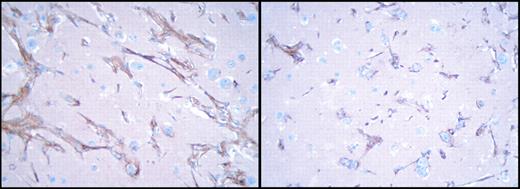Comment on Yu et al, page 1734
Yu and colleagues have characterized sequential transforming events that drive the up-regulation of tissue factor on colorectal tumor cells. Furthermore, tissue factor expression defines the aggressive character of these cells in vivo.
In the last decade, tissue factor has been found to impact nonhemostatic physiologic processes in a dramatic way. The primary initiator of the coagulation cascade is indispensable for normal embryonic development and plays a significant role in inflammatory processes.1,2 However, it has also become clear that tissue factor expression and oncogenic processes are tightly associated. Tumor metastasis, for example, appears to be critically dependent on tissue factor overexpression; metastatic cells may express up to 1000-fold more tissue factor than their nonmalignant counterparts. In addition, a number of studies demonstrate that tissue factor is both a significant risk factor for hepatic metastasis in patients suffering from colon cancer and essential for metastasis in a murine pulmonary metastasis model.3,4 FIG1
Effect of TF gene silencing on HCT116 tumor growth and angiogenesis. See the complete figure in the article beginning on page 1734.
Effect of TF gene silencing on HCT116 tumor growth and angiogenesis. See the complete figure in the article beginning on page 1734.
Tissue factor has also been found up-regulated on primary tumor cells, and many tumors show a dramatically increased procoagulant activity. Surprisingly, very little is known about the molecular mechanism underlying tissue factor overexpression in cancer cells and the impact of tissue factor overexpression on primary tumor growth. In this issue, Yu and colleagues unravel the nature of the transformation events that lead to deregulated tissue factor production in colorectal cancer cells. They show that K-ras and p53 mutation lead to a cumulative overexpression of both cell surface–exposed tissue factor and circulating tissue factor in the plasma of tumor-bearing mice. Expression of tissue factor was found to be required for the full manifestation of both tumor angiogenesis and aggressive tumor cell behavior in vivo, possibly via regulation of the antiangiogenic factors thrombospondin-1 and 2.
Interestingly, tissue factor expression is not a transforming event per se; tissue factor–associated aggressiveness was found to be strictly dependent on the host environment, since tissue factor dramatically influenced tumor growth properties in vivo but did not alter growth properties in vitro. Therefore, although highly speculative, this finding may point toward a role for tissue factor ligands, such as factor VII/VIIa or plasminogen, in oncogenic events. Since both hemostatic factors have been shown to induce tissue factor–dependent intracellular signaling cascades, they may be the direct trigger of tissue factor–associated tumor cell aggressiveness.2,5 Alternatively, activation of downstream coagulation factors such as FX or prothrombin may facilitate this process.
Understanding the role of tissue factor in primary tumor growth may be of vital importance for the development of new anticancer therapies. Directly targeting the transforming oncogenes is often not feasible, whereas blockade of downstream events, such as tissue factor function, may be more effective. Thus, the work described by Yu et al provides valuable information that may facilitate the use of tissue factor–blocking strategies in cancer. ▪


This feature is available to Subscribers Only
Sign In or Create an Account Close Modal